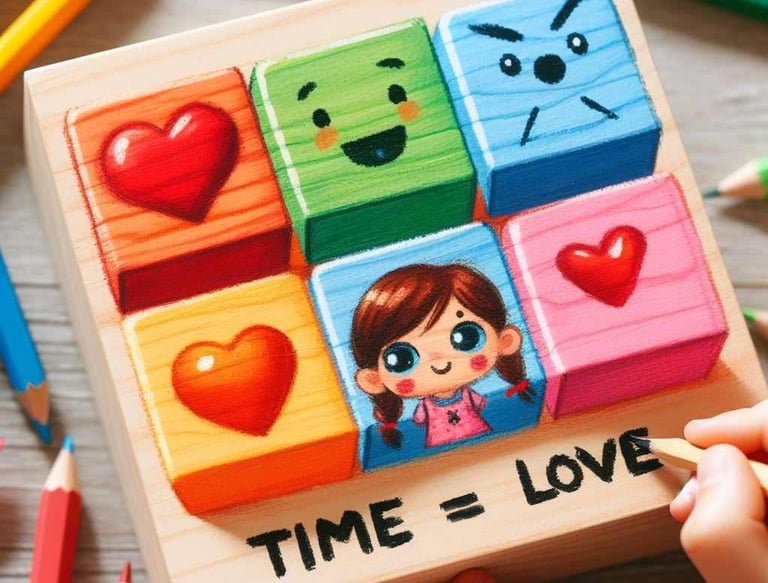TIME = LOVE
4/4/20243 min read


The best present is your presence
In the intricate tapestry of a child's emotional development, few threads are as crucial as quality time spent with loved ones. Children are not just passive recipients of care; they are perceptive observers who interpret gestures of affection as markers of love and security. Quality time is not just a luxury—it is a fundamental ingredient for healthy emotional growth. In this blog, we will explore how children view quality time as an expression of love, its profound impact on their emotional well-being, and practical ways to cultivate these connections.
The Language of Love: Quality Time through a Child's Eyes
For children, love is not an abstract concept; it is a tangible experience woven into the fabric of everyday interactions. Whether it is reading a bedtime story, playing in the park, or simply engaging in conversation, children interpret these moments as acts of love and care from their caregivers. Quality time serves as a language through which children learn to understand and express affection.
Children are remarkably perceptive when it comes to gauging the sincerity and depth of these interactions. They do not measure love in grand gestures or material possessions but in the consistency and authenticity of the time spent together. A parent who listens attentively, shares laughter, and offers undivided attention communicates volumes about their love and commitment.
The Impact on Emotional Well-being
The emotional benefits of quality time extend far beyond fleeting moments of joy. Research consistently highlights the profound impact of parental involvement and nurturing relationships on children's emotional well-being. When children feel valued, understood, and emotionally supported, they develop a sense of security and resilience that serves as a buffer against life's challenges.
Quality time acts as a protective shield against various emotional difficulties, including anxiety, depression, and behavioral issues. It fosters a strong parent-child bond that becomes a safe harbor during times of stress or uncertainty. Children who experience regular quality time with their caregivers tend to exhibit higher levels of self-esteem, empathy, and emotional intelligence.
Practical Ways to Spend Quality Time Together
In today's fast-paced world, finding time for meaningful interactions can be challenging, but it is essential to prioritize these moments for the sake of our children's well-being. Quality time does not necessarily require elaborate plans or expensive outings; it is about being present and engaged in the moment. Here are some practical ways to cultivate quality time with your child.
Establish Rituals
Create routines and rituals that involve spending time together, whether it is a weekly movie night, Sunday morning pancake breakfast, or a daily bedtime routine. These rituals provide a sense of predictability and security for children while strengthening your bond.
Unplug and Connect
In today's digital age, getting caught up in screens and distractions is easy. Set aside dedicated tech-free time to focus solely on each other. Whether it is a family game night, a nature walk, or simply sitting and talking, unplugging allows for deeper connections.
Follow Their Lead
Take cues from your child's interests and preferences when planning activities. Whether they enjoy painting, building forts, or exploring nature, participating in activities they love shows them that you value their individuality and enjoy spending time with them.
Meaningful Conversations
Engage in meaningful conversations that go beyond surface-level exchanges. Ask open-ended questions, listen actively, and validate their feelings. These conversations not only strengthen your bond but also foster emotional intelligence and communication skills.
Create Memories
Make an effort to create lasting memories together. Whether it is a family vacation, a special outing, or even a spontaneous adventure in your neighborhood, these shared experiences become cherished memories that your child will carry with them throughout their lives.
Conclusion
Quality time is not just a luxury; it is a cornerstone of a child's emotional well-being. Children interpret these moments of connection and engagement as expressions of love and care from their caregivers. By prioritizing quality time and nurturing meaningful relationships, we provide our children with the emotional support and resilience they need to thrive. In a world filled with distractions, let us not forget the profound impact of simply being present and engaged in the lives of our little ones.
For more resources and or help
The Texas Parent Helpline team is ready to listen, find solutions, and direct you to the right local resources.
Call 833-680-0611 Text 833-680-0611
"...but Jesus said, “Let the little children come to me and do not hinder them, for to such belongs the kingdom of heaven.” Matthew 19:14 ESV









